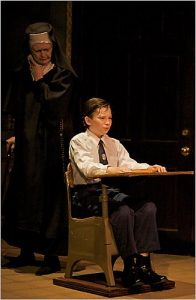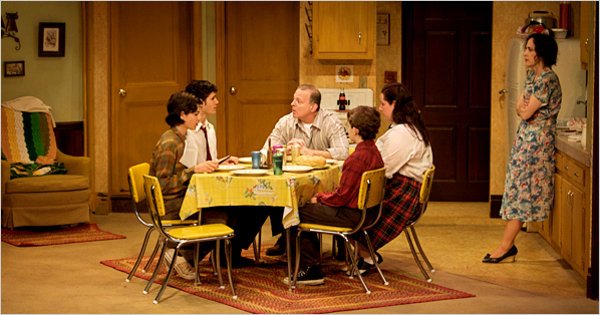When little Rudy Pazinski prays, he asks Jesus to make his teacher Sister Clarissa not so mean, to make sure Dad doesn’t forget to pick up the spaghetti and, while he’s at it, to put Dad in a good mood that night.
It’s a practical approach to prayer, but then Rudy is a very practical seventh grader in Tom Dudzick’s “Over the Tavern,” the sweet, funny, gently irreverent opening production of the Penguin Repertory Theater’s 2010 season.
Growing up in Buffalo in 1959, Rudy is the say-anything-that-comes-to-mind star of the show. And he’s played by a rising star, 12-year-old Christopher Cox, who performed on Broadway as Mother’s Little Boy in last fall’s revival of “Ragtime.” (USA Today liked his “sweetness and spunk.” The Washington Post called him irresistible.) But the whole Pazinski family, as a unit, is just as important to the overall picture.
Mr. Dudzick has written them cute. They are, after all, inspired by his own family, who did indeed live in an apartment over the family tavern in Buffalo when he was a boy. But the casting director, Cindi Rush, has spiced up the recipe by assembling a particularly likable cast of fine actors who seem a little mismatched, as all families must feel sometimes. (What child hasn’t wondered: who are these strange people who claim to be my parents? And what parent hasn’t thought the same thing, at least once, about his or her children?)
Kathryn Markey is lovable as Ellen, the mother, who matter-of-factly keeps her husband and four children in line. Only a wry sense of humor (and the mid-20th-century American view of women’s roles) keep her going. It does seem like a stretch, though, that when her husband forgets to pick up that spaghetti dinner from the local restaurant, the only things she has in the cupboard are canned beets and breakfast cereal.
Chet, her husband, is played with convincing paternal exhaustion, grumpiness and cluelessness by Kevin Cutts. Mr. Cutts makes an undershirt, boxer shorts and knee-high socks seem like perfectly normal at-home wear. Until a nun shows up at his door.
Jonny and Stephan Adamow, real-life brothers from Stony Point, are making their professional theater debuts as the Pazinskis’ other two sons, Georgie and Eddie.
Georgie looks healthy and robust, but it soon becomes clear that he has Down syndrome. It is equally clear that his siblings love him deeply and would never think about being embarrassed by him. I like the way Jonny Adamow plays the scene in which his mother edges Georgie back from his spot on the floor where he is watching TV inches from the screen.
Eddie is the eldest child, a teenager with the usual preoccupations with sex and independence. Stephan Adamow makes the character both attractive as a young man and sympathetic as the little boy who still lives inside him. Stephan is taller than Ms. Markey, adding a nice physical dynamic to her (highly effective) attempts to control this giant child as long as he lives under her roof.
Ashley Scales plays Annie, the only daughter, an insecure adolescent who faces life awkwardly. Her acts of rebellion — like teasing her hair to ridiculous proportions (“It looks like the pope’s hat,” her mother tells her) — generally don’t go well. But Annie generates a radiance that turns into beauty when she learns that the boy next to her in glee club likes her.
There wouldn’t be much of a plot, though, without Sister Clarissa (Judy Frank), the bane of Rudy’s Catholic school existence. To be fair, Rudy is pretty much the bane of hers too. He prefers imitating Ed Sullivan to memorizing the corporal and spiritual works of mercy. “Did Ed Sullivan die for your sins?” Sister Clarissa asks him.
When Rudy announces that he refuses to be confirmed, the good sister visits the Pazinskis’ home. There, things just get worse. Rudy announces that he’s read that “there are over 1,300 religions in the world” and, now that he’s aware of that, he says, “I’d like to shop around.” You can imagine the sister’s reaction.
Ms. Frank is called on to show us two very different sides of her character: the comically strict teaching nun; then, in the latter part of Act II, the real human being she is when she’s off duty. She does both well, but Mr. Dudzick’s script makes Sister Clarissa awfully easy to impress. When Rudy makes her a rosary out of Trix cereal, you’d think he’d recreated the Sistine Chapel ceiling.
Thomas Caruso has directed “Over the Tavern” with affection and comic vitality. Yes, it’s pretty much just a staged sitcom with a dash of pretend blasphemy, but it has real heart.

